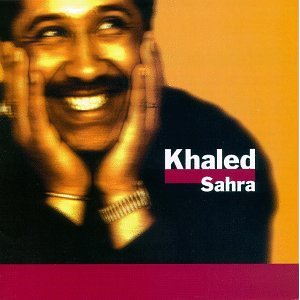Music |
Cheb Khaled
By
Published: May 10, 2016
Category:
World
Khaled’s New York concert was to have been held shortly after 9/11, but what were the chances that Arabs living in Europe were getting on planes bound for New York in October of 2001? The concert was rescheduled. And when it finally happened, the audience was the most gloriously international gathering of adults I’ve ever seen in a theater. Grown-ups, not kids. And Khaled, decorated all over — an Israeli flag, Arab head gear, Algerian scarf. The aisles were filled with running, screaming fans. There was nearly a riot.
Blame it on Khaled. He’s little known in the United States, but he’s one of the world’s biggest music stars. Bigger in India than Michael Jackson — the "King of Rai" toppled "the King of Pop." Forty-five million CDs sold, including the single biggest-selling album in the Middle East.
Rai can be raw. And was, in the early days. Khaled’s become much slicker. Here’s “Aicha,” a love song about — and for —his daughter. It’s almost a ballad. But it kicks just enough to have been the top-selling song in all of Europe the year it was released.
Catchy? Sure. As a romantic ideal, though, the guy seems handsome, pleasant — but not a heartthrob. How very wrong you would be to think that. When we saw him, a decade after he made that video, he reminded me of nothing so much as an Algerian Van Morrison — no oil painting. The women didn’t care. Clearly, it’s about the music. Where to start? There’s so much, and the purist in me says to go with the early, raw stuff, released on tiny foreign labels. Then I catch myself and go with a more accessible choice: “Sahra,” Khaled’s breakthrough CD in 1997. [To buy the CD from Amazon, click here. To download the MP3 from Amazon, click here.]
Unless you’re exceptionally devoted to NPR, the odds are that you have never heard of Khaled, or, for that matter, his brand of music. Rai comes out of the religious music of northwestern Algeria . But as rock ‘n roll moved around the world, the background got livelier — accordion, electric guitar, multiple drums — and the lyrics were no longer derived from Sufi prayers. Instead of hymns to God, singers started praising alcohol, parties, sex. And politics — which is why “Rai,” freely translated, means “point-of-view” or “my way.”
In one song, he sings of “Islamic charlatans” — yes, that could inspire a guy to put some distance between himself and the Fundamentalists. Especially because he was also singing about women’s’ liberation, religious freedom and cultural tolerance. And because Islamic fundamentalists did assassinate a Rai singer in Algeria, Rai singers promptly fled to Paris, where Khaled would come to record with some Jamaican musicians and hire Don Was, a Jew from Los Angeles, as his producer.
It’s more international than you’d expect — this is really Rai blended with reggae. But there are no formulas here; every song has its own appeal, and there isn’t a dud in the bunch. It works at any volume: background music, during dinner, full party mode, late at night, mood music.
“What was that?” friends may ask. Worldly, world-music you now has a ready answer: “Pop music from the Middle East — fun, isn’t it?”
BONUS VIDEO


